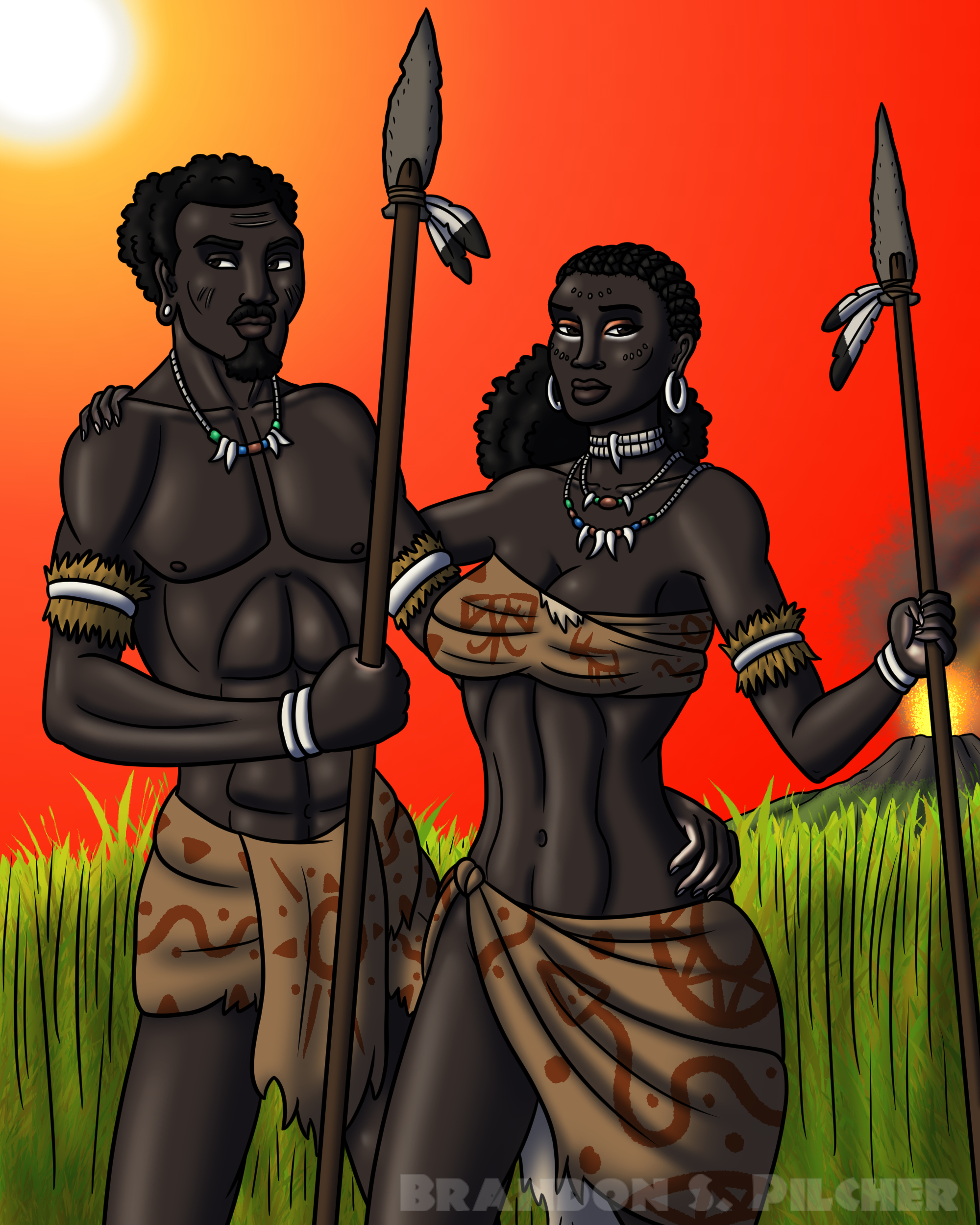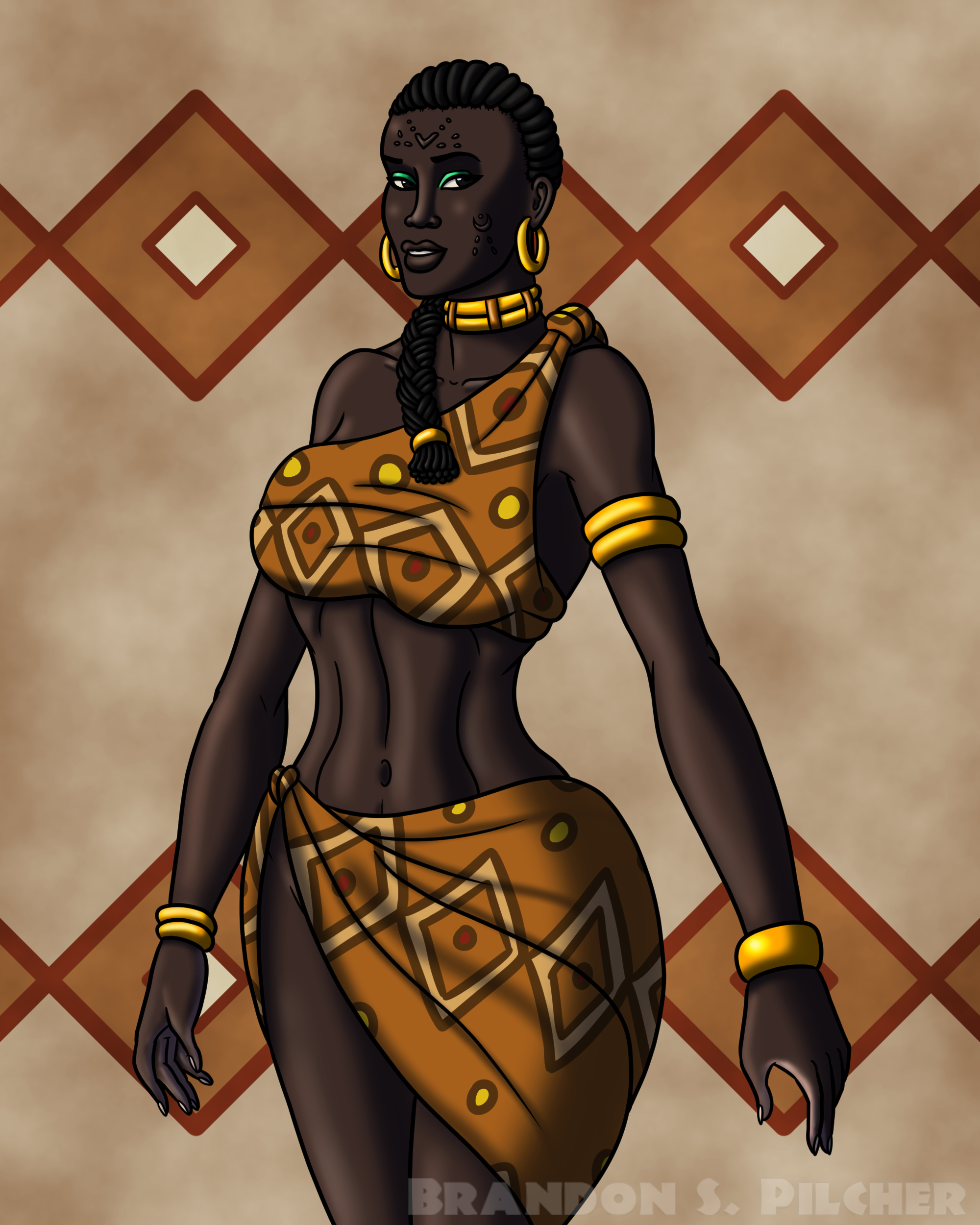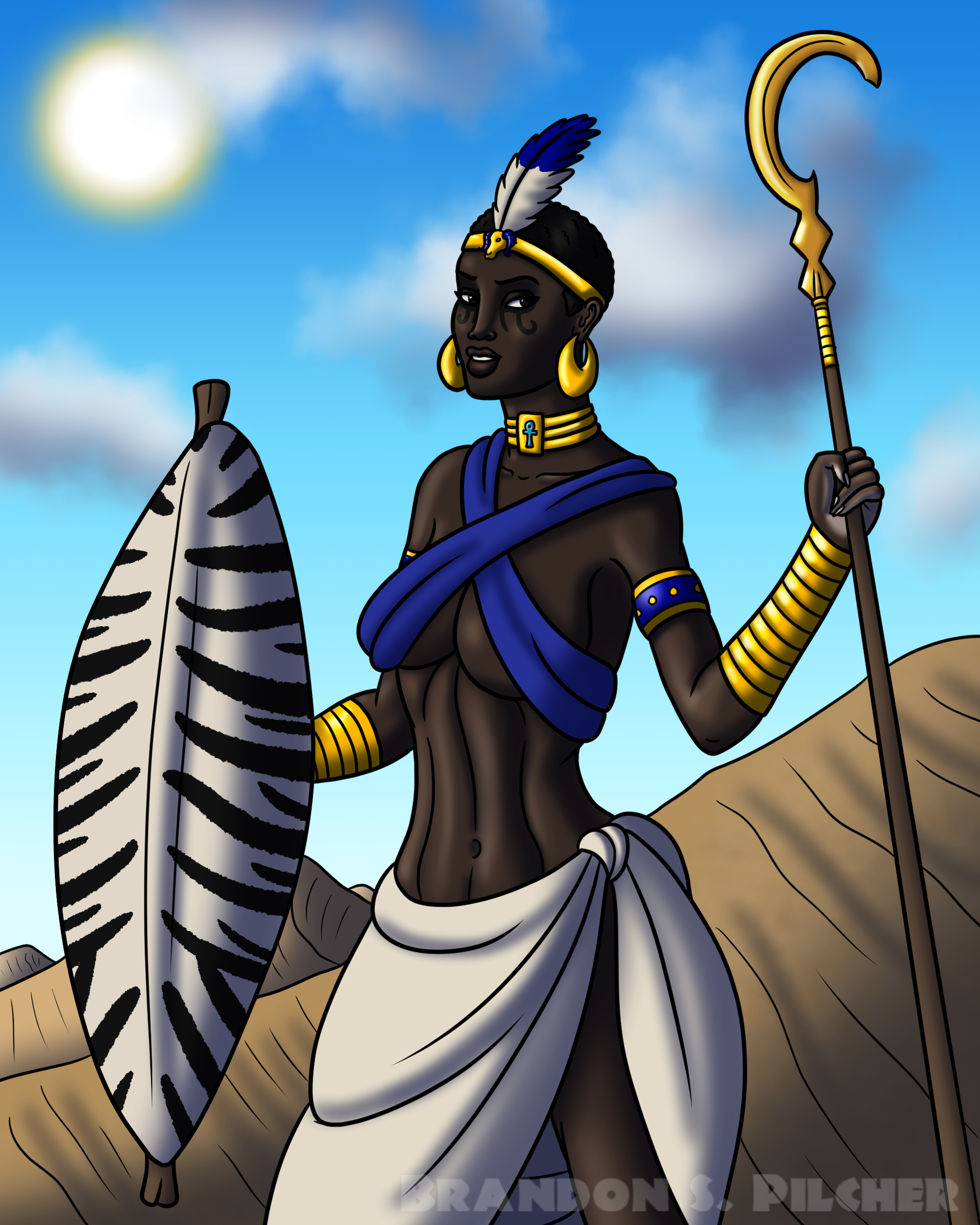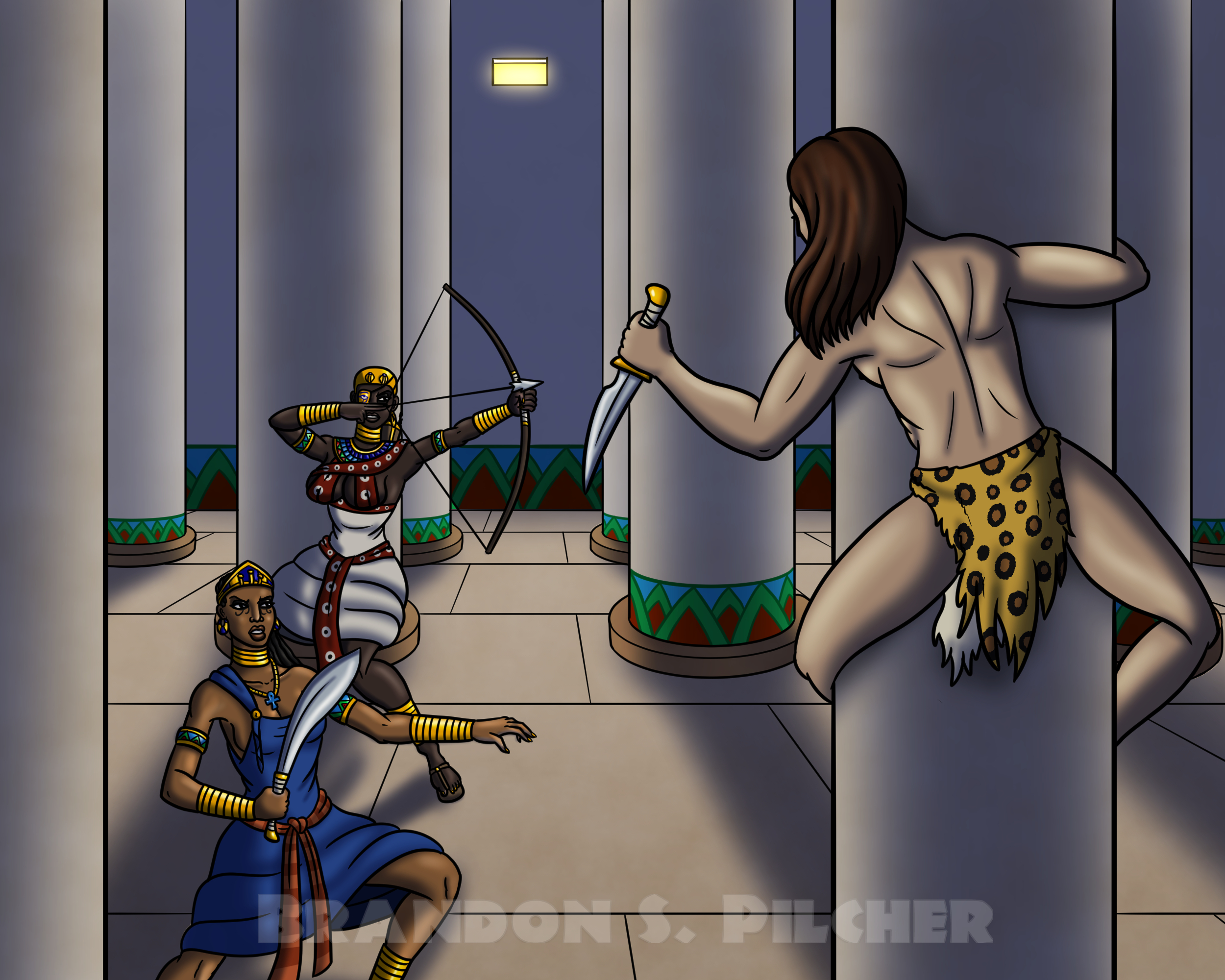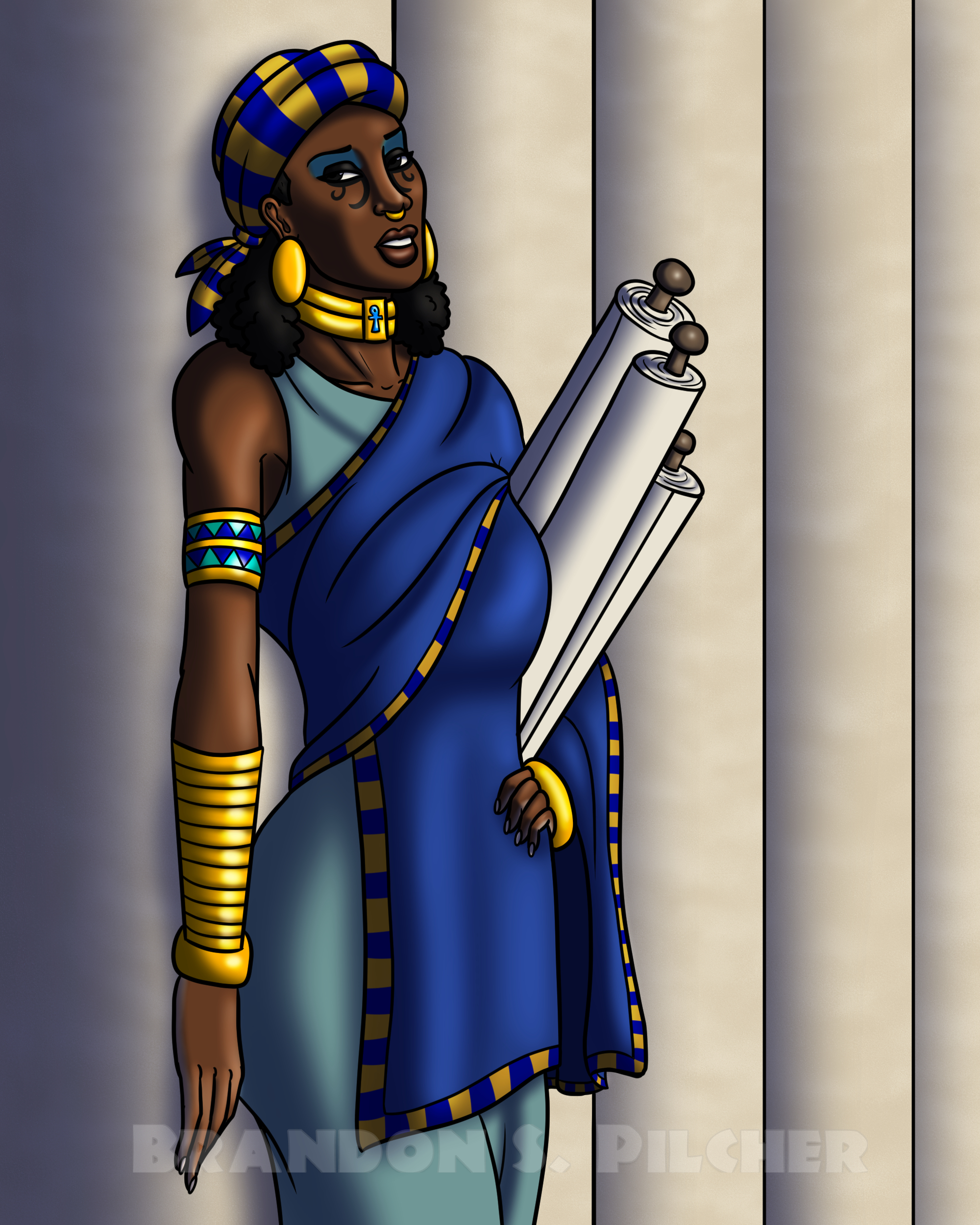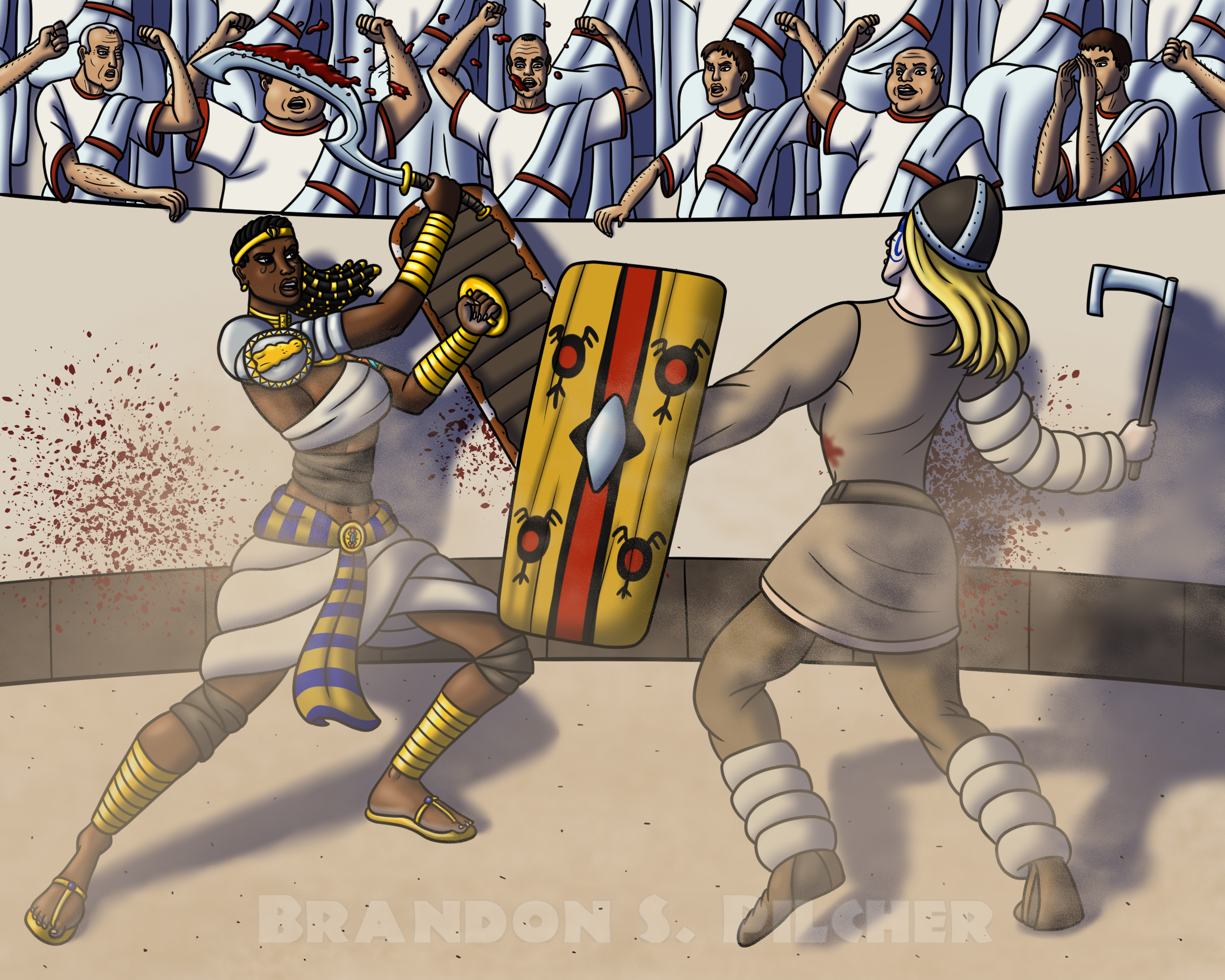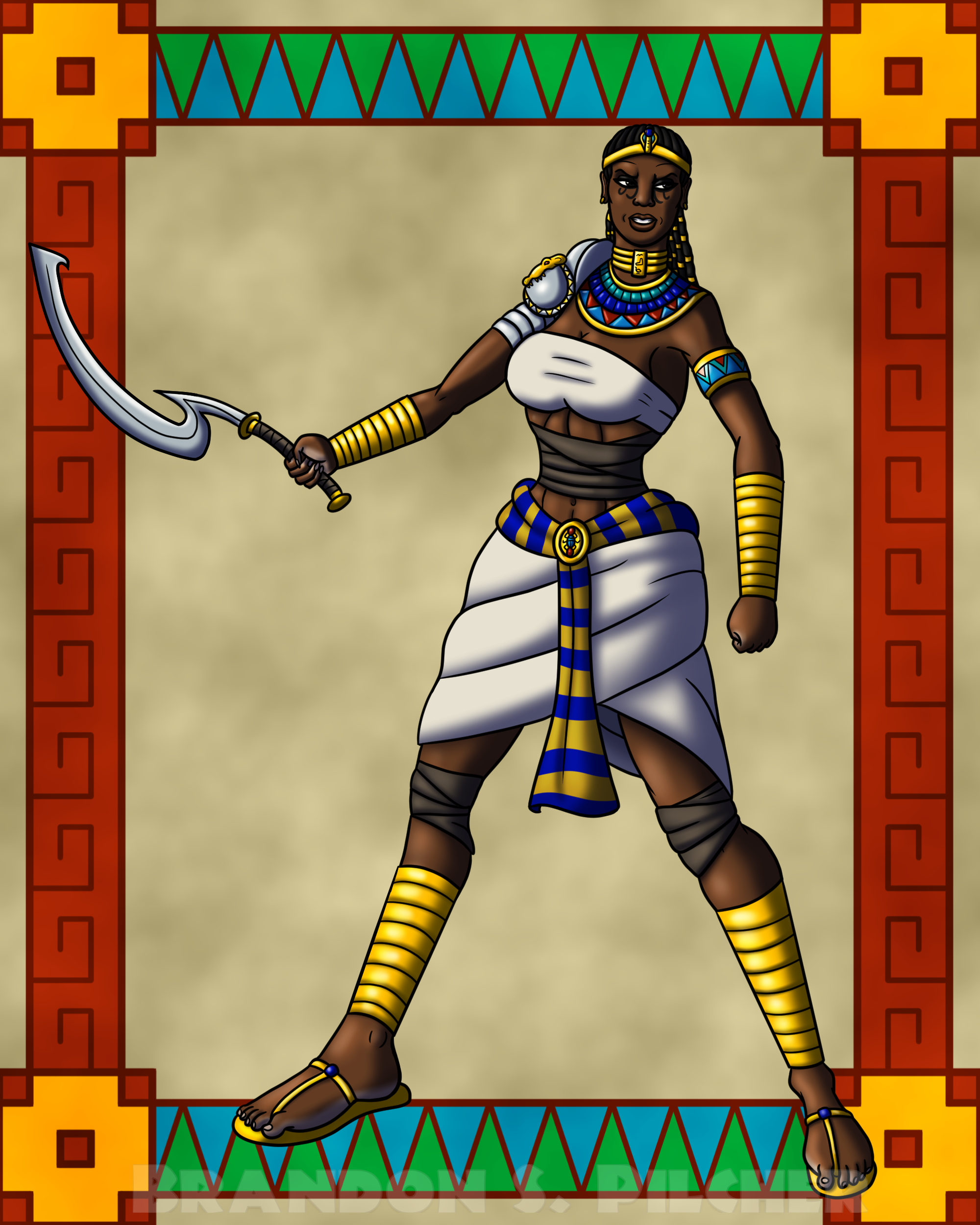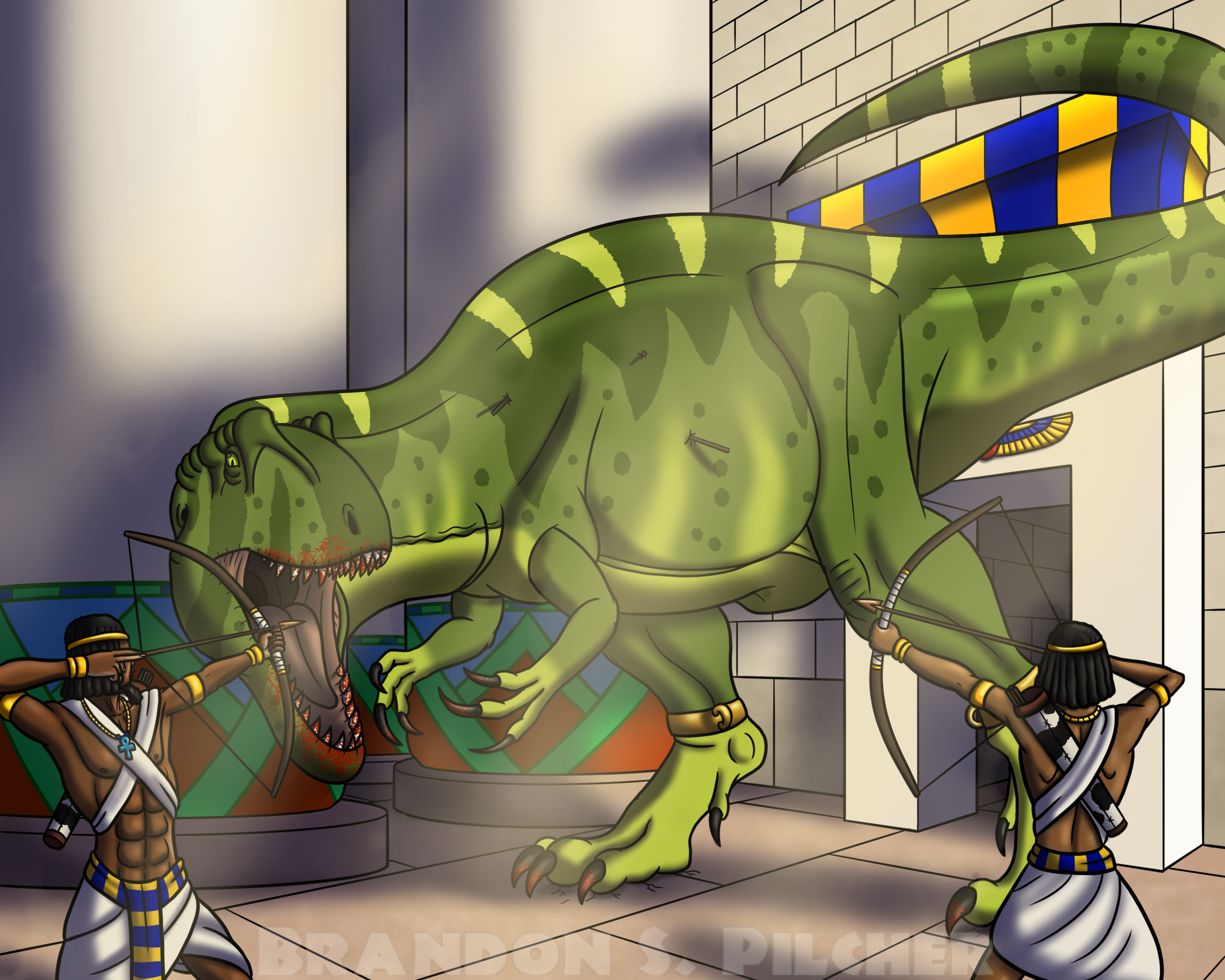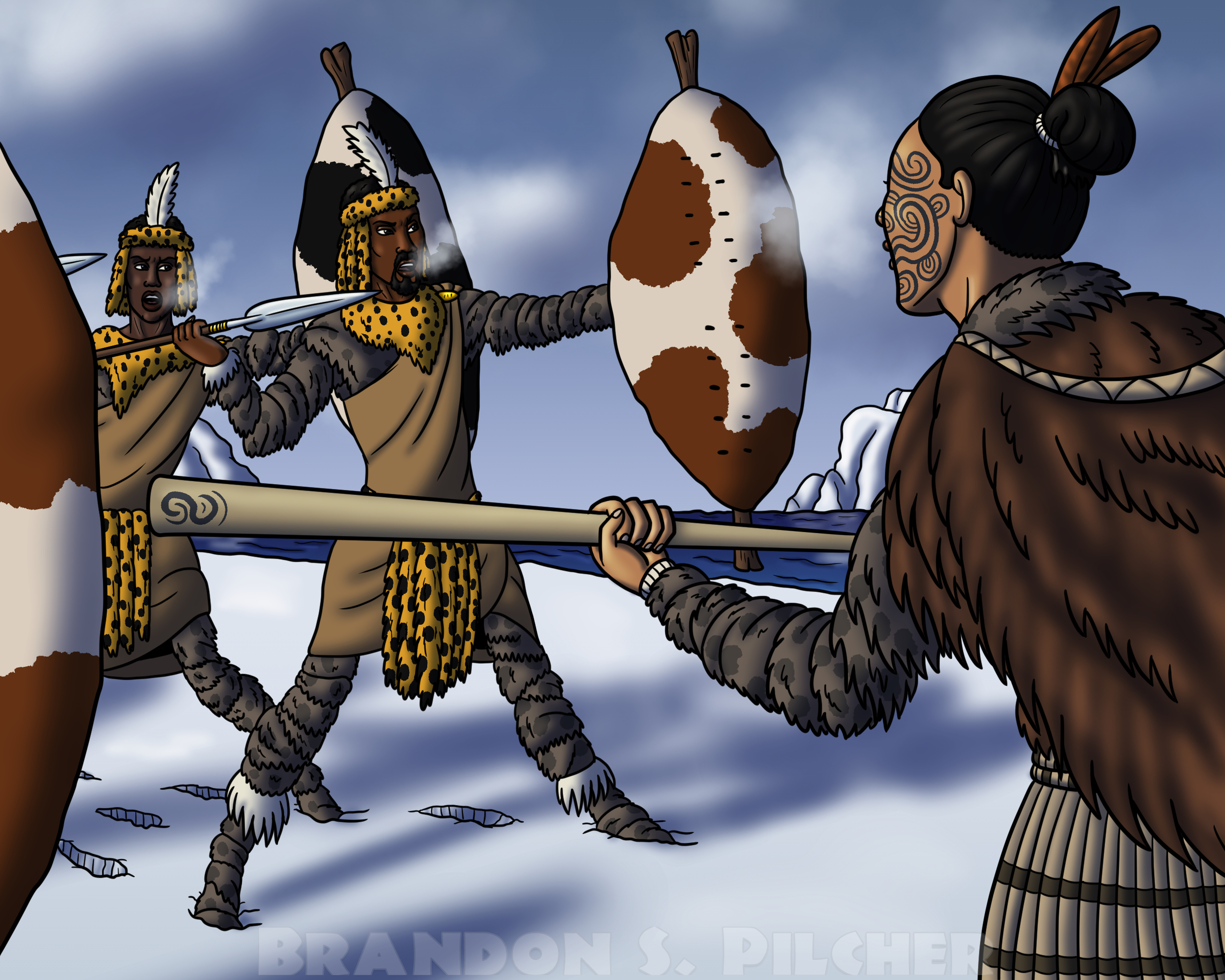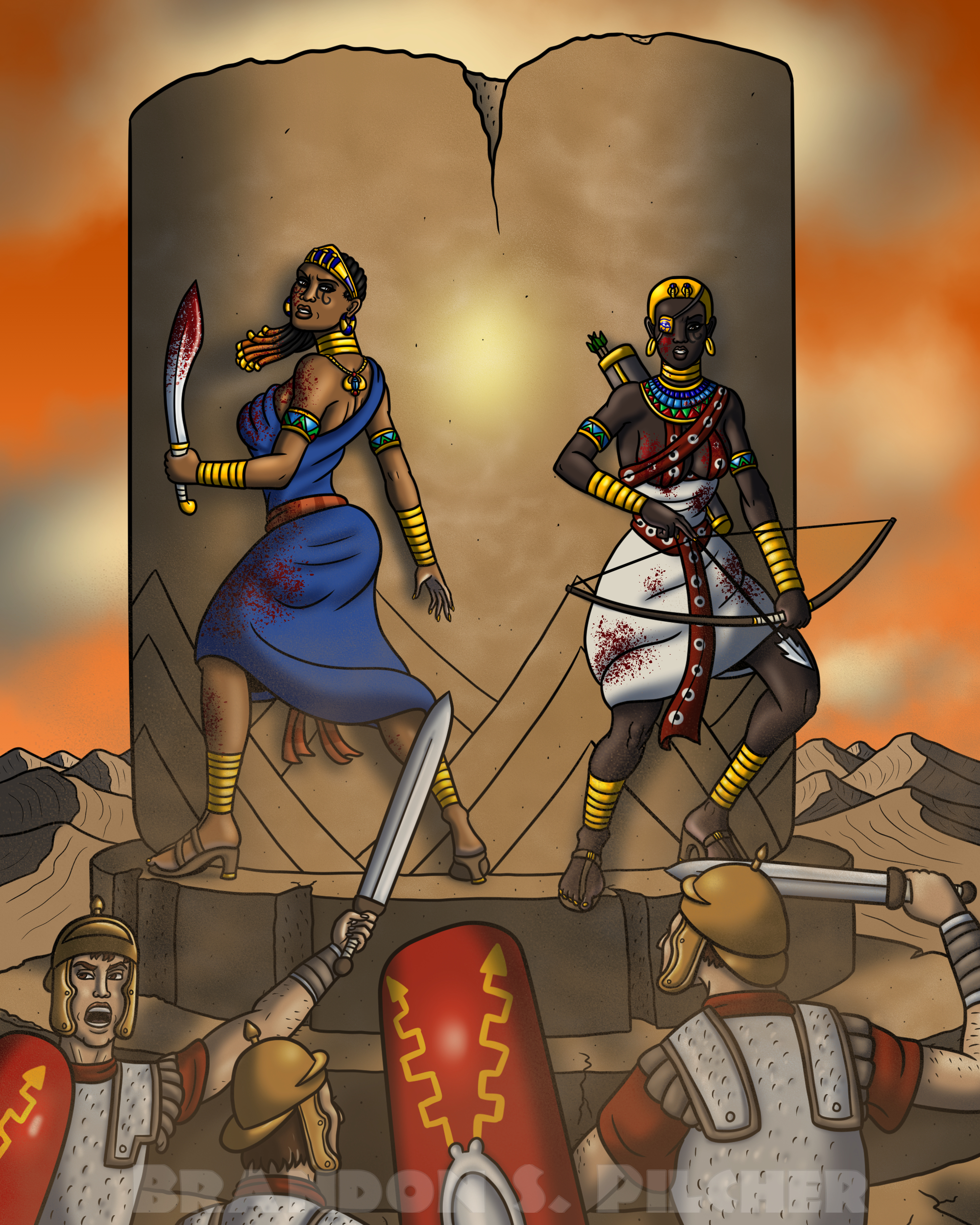

@BrandonPilcher
Artist and author based in Southern California who loves prehistoric life, ancient history, fantasy literature and media, video games, and strong action heroines of color!
62 Записей
22 Фото
0 Видео
-
These two represent a couple of basal Homo sapiens from Africa anywhere between 300,000 and 70,000 years ago, before our species dispersed out of the continent and throughout the rest of the world. I based their facial features off those of specimens like Jebel Irhoud, Omo Kibish, and Herto Man, although their influence may be more apparent in the man here since male humans tend to have more prominent brow ridges than females in any population.These two represent a couple of basal Homo sapiens from Africa anywhere between 300,000 and 70,000 years ago, before our species dispersed out of the continent and throughout the rest of the world. I based their facial features off those of specimens like Jebel Irhoud, Omo Kibish, and Herto Man, although their influence may be more apparent in the man here since male humans tend to have more prominent brow ridges than females in any population.0 Комментарии ·0 Поделились · ·
-
This started out as a simple sketch of a strolling woman, without any specific culture in mind for her. That’s probably why her design might come across a little generic. I am proud of the idea of her having her dreadlocks braided together into a ponytail though.This started out as a simple sketch of a strolling woman, without any specific culture in mind for her. That’s probably why her design might come across a little generic. I am proud of the idea of her having her dreadlocks braided together into a ponytail though.0 Комментарии ·0 Поделились · ·
-
This is my interpretation of Amanra, the fleet-footed and agile Nubian warrior princess from the real-time strategy game Age of Mythology‘s single-player campaign. Not only was she fierce, courageous, and noble, but she had quite an attractive design (as far as computer-game characters with low-poly models from the early 2000s went). I truly think she is an underrated heroine!This is my interpretation of Amanra, the fleet-footed and agile Nubian warrior princess from the real-time strategy game Age of Mythology‘s single-player campaign. Not only was she fierce, courageous, and noble, but she had quite an attractive design (as far as computer-game characters with low-poly models from the early 2000s went). I truly think she is an underrated heroine!0 Комментарии ·0 Поделились · ·
-
It is 30 BC in an alternate timeline, and the Romans have used a sorcerous rite powered by the time god Saturn to pluck Tarzan of the Apes out of the early 20th century into their own time. They tell the poor ape-man that they will let him return home only on the condition that he assassinate those two troublesome Queens of the Nile, Cleopatra of Egypt and Amanirenas of Kush. Can our two heroines fend off Tarzan’s attacks and then offer him an alternate path to his native time period?It is 30 BC in an alternate timeline, and the Romans have used a sorcerous rite powered by the time god Saturn to pluck Tarzan of the Apes out of the early 20th century into their own time. They tell the poor ape-man that they will let him return home only on the condition that he assassinate those two troublesome Queens of the Nile, Cleopatra of Egypt and Amanirenas of Kush. Can our two heroines fend off Tarzan’s attacks and then offer him an alternate path to his native time period?0 Комментарии ·0 Поделились · ·
-
This is a depiction of mine of the scholar Hypatia of Alexandria, who lived and studied in Roman Egypt until she died in 415 AD. A teacher and scholar of Neoplatonic philosophy who also built scientific instruments such as astrolabes and hydrometers, she became an adviser to the Roman prefect Orestes, whose conflict with the Christian bishop Cyril would ultimately drag her into the early Christian community’s crosshairs. Hypatia would face a brutal death at the hands of a Christian mob who had her stripped naked and assaulted with ostraka (possibly meaning either roof tiles or oyster shells), dragged through the streets of Alexandria, and set her remains on fire. Some historians have claimed Hypatia’s murder represents the “death of classical antiquity” at the hands of religious fanaticism, but it should be noted that the mob’s reason for targeting Hypatia had more to do with her alliance with Orestes, himself a Christian, than anything she had taught as a scholar and philosopher.
We do not know much about Hypatia’s background other than that she had a father named Theon, and her physical appearance remains unknown to the best of my knowledge. Although her name is of Greek origin, there are records of indigenous Egyptians, Jews, and other non-Hellenes in Egypt assuming Greek names during the Greco-Roman periods, so I believe it is possible that Hypatia was of Egyptian (or other African) descent rather than strictly Greek as commonly shown in artistic portrayals.This is a depiction of mine of the scholar Hypatia of Alexandria, who lived and studied in Roman Egypt until she died in 415 AD. A teacher and scholar of Neoplatonic philosophy who also built scientific instruments such as astrolabes and hydrometers, she became an adviser to the Roman prefect Orestes, whose conflict with the Christian bishop Cyril would ultimately drag her into the early Christian community’s crosshairs. Hypatia would face a brutal death at the hands of a Christian mob who had her stripped naked and assaulted with ostraka (possibly meaning either roof tiles or oyster shells), dragged through the streets of Alexandria, and set her remains on fire. Some historians have claimed Hypatia’s murder represents the “death of classical antiquity” at the hands of religious fanaticism, but it should be noted that the mob’s reason for targeting Hypatia had more to do with her alliance with Orestes, himself a Christian, than anything she had taught as a scholar and philosopher. We do not know much about Hypatia’s background other than that she had a father named Theon, and her physical appearance remains unknown to the best of my knowledge. Although her name is of Greek origin, there are records of indigenous Egyptians, Jews, and other non-Hellenes in Egypt assuming Greek names during the Greco-Roman periods, so I believe it is possible that Hypatia was of Egyptian (or other African) descent rather than strictly Greek as commonly shown in artistic portrayals.0 Комментарии ·0 Поделились · · -
In the Roman Colosseum, our Egyptian gladiatrix heroine has just delivered a lethal blow to her Germanic opponent! Whichever fighter they’re rooting for, you can see the Roman spectators are loving this!
If you’re wondering what those big leggings the German girl has on, they are supposed to be thick padded cloth which some gladiators would wear on their arms and legs.In the Roman Colosseum, our Egyptian gladiatrix heroine has just delivered a lethal blow to her Germanic opponent! Whichever fighter they’re rooting for, you can see the Roman spectators are loving this! If you’re wondering what those big leggings the German girl has on, they are supposed to be thick padded cloth which some gladiators would wear on their arms and legs.0 Комментарии ·0 Поделились · · -
This heroine would be an Egyptian female gladiator (or gladiatrix) who fights for the entertainment of Roman audiences. The design isn’t necessarily meant to be all that historically accurate, but given that female gladiators are known from Roman records (albeit not too many of them) and that Egypt was among the Roman Empire’s most economically important provinces, the existence of a character like her shouldn’t be beyond possibility.This heroine would be an Egyptian female gladiator (or gladiatrix) who fights for the entertainment of Roman audiences. The design isn’t necessarily meant to be all that historically accurate, but given that female gladiators are known from Roman records (albeit not too many of them) and that Egypt was among the Roman Empire’s most economically important provinces, the existence of a character like her shouldn’t be beyond possibility.0 Комментарии ·0 Поделились · ·
-
After having been brought over from the lost jungle oasis it once called home, a Carcharodontosaurus saharicus has broken out of captivity and is now on the rampage in ancient Egypt. It has made its way to a sunlit courtyard inside one of the temples, where the Egyptian city guards hope to bring its menace to a halt to the best of their ability!
Aficionados of dinosaur cinema might recognize this as being inspired by a scene in the 1969 Ray Harryhausen film The Valley of Gwangi, in which the titular Allosaurus terrorizes a turn-of-the-century Mexican town and ends up in a Catholic cathedral.After having been brought over from the lost jungle oasis it once called home, a Carcharodontosaurus saharicus has broken out of captivity and is now on the rampage in ancient Egypt. It has made its way to a sunlit courtyard inside one of the temples, where the Egyptian city guards hope to bring its menace to a halt to the best of their ability! Aficionados of dinosaur cinema might recognize this as being inspired by a scene in the 1969 Ray Harryhausen film The Valley of Gwangi, in which the titular Allosaurus terrorizes a turn-of-the-century Mexican town and ends up in a Catholic cathedral.0 Комментарии ·0 Поделились · · -
It is the 1800s in an alternate timeline, and the Zulu and the Maori are fighting over the far southern continent of Antarctica and whatever riches might lie underneath its ice sheets!
Giving both the Zulu and Maori attire suitable for the Antarctic cold while still keeping them recognizable as Zulu and Maori presented a bit of a challenge, I will admit. What I went with was wrapping their limbs with local leopard seal fur as well as giving the Zulu leather cloaks called karosses.It is the 1800s in an alternate timeline, and the Zulu and the Maori are fighting over the far southern continent of Antarctica and whatever riches might lie underneath its ice sheets! Giving both the Zulu and Maori attire suitable for the Antarctic cold while still keeping them recognizable as Zulu and Maori presented a bit of a challenge, I will admit. What I went with was wrapping their limbs with local leopard seal fur as well as giving the Zulu leather cloaks called karosses.0 Комментарии ·0 Поделились · · -
The Nile Valley queens Cleopatra of Egypt and Amanirenas of Kush are up against the wrath of the Roman legions! Can our heroines fight their way out of this predicament and defeat one the mightiest armies in the first century BC?
This is of course a fictional “alternate history” scenario I did for the sheer fun of it, but I really like the idea of Cleo and Amani teaming up against Rome. One wonders whether Cleopatra’s Egypt might have held up a little longer with more Kushite support…The Nile Valley queens Cleopatra of Egypt and Amanirenas of Kush are up against the wrath of the Roman legions! Can our heroines fight their way out of this predicament and defeat one the mightiest armies in the first century BC? This is of course a fictional “alternate history” scenario I did for the sheer fun of it, but I really like the idea of Cleo and Amani teaming up against Rome. One wonders whether Cleopatra’s Egypt might have held up a little longer with more Kushite support…0 Комментарии ·0 Поделились · ·
Больше



